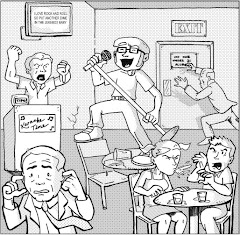Zed #6, 2005, Gagne International Press
by Michel Gagne
In the context of the comic books I’ve reviewed lately, Zed #6 is easy reading material. In fact, the entire issue took only minutes to consume, which is saying something considering how much time a fully illustrated twenty-two-page book takes to read and analyze. I’m trying to take this project seriously, despite some of the frivolous fluff I’ve encountered. I’m trying to accept the responsibility of this challenge, even six months later, as every day I’m potentially handling somebody’s life’s work. I can’t dismiss it as fluff, for their sake. Even if it is.
Fortunately, Zed #6 is not fluff. In fact, this issue represents my dilemma, eliciting my sympathy for Zed, a squiggle of a character waking from a ten-year near-death experience to find his world savagely ravaged by the despot Maxuss. Zed visits his Uncle Lazar to gather the decade’s news, when Maxuss tracks him down and sends a robotic drone to attack. Uncle Lazar is potentially fatally wounded, and Zed is apparently outmatched. To be continued. Gagne is a ruthless writer, gently building a house of cards for the reader and intentionally swiping at it to ignite our empathy and excitement. He makes us feel for Zed like we’re supposed to. It’s a good thing.
I’m not familiar with Gagne’s entire body of work, but I have seen what he is capable of before, thanks to his multi-part Detective Comics back-up story “Spore.” In “Spore,” an alien possesses Batman and grows into a city-sprawling parasite, but not before the Dark Knight injects himself with a microchip that fights the symbiote on a cellular level. Much of the story is told from the microscopic perspective, but illustrated as if the conflict was larger than life. So, approaching Zed, I knew what to expect, and Gagne delivered, thankfully on a more above-epidermal level. Some perceive abstract art as a stretch of reality, retaining just enough of its subject’s characteristics to identify what it is. Gagne’s work is seemingly the inverse; he taps into the abstract dimensions around us and barely contains them in brushstroke, capturing them in bubbly, wavy lines that just manage familiarity. It’s refreshing.
But what does this have to do with A Comic A Day? I don’t want to be a Maxuss to some proverbial Zed’s home world. I know how I feel about this blog, the more in depth I plunge into its potential, so I can only imagine what a comic book means to its creator. Look at Gagne’s investment; he published Zed himself, and for a guy that can secure a back-up in Detective, he probably had other options. His creativity became his responsibility, a lofty life’s goal that produced ironically entertaining results. We artists can only hope.
Tuesday, January 30, 2007
Subscribe to:
Post Comments (Atom)



No comments:
Post a Comment